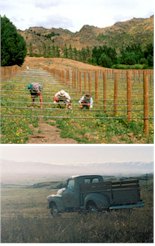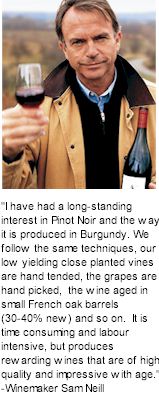


Two Paddocks' three vineyards are located in Central Otago on the South Island of New Zealand. From this golden countryside, where old trails still wind through historic gold mines and ice blue lakes nestle below rugged mountains, comes some of the world's best Pinot Noir, a wine that will rival the great Pinot Noirs of Burgundy. It's the region's continental climate with its hot dry summers, cool autumns, and cold winters that provides the perfect environment to nurture the perfect grape. Add to that warm days and cool nights for colour and stability and the wine that results is nothing less than excellence.

The winery started in 1993 with modest ambitions and initial plantings of five acres of Pinot Noir at the original little vineyard at Gibbston, Central Otago in the deep south of New Zealand. At the same time, winery friend Roger Donaldson planted the land next door, hence the name Two Paddocks. (Roger’s paddock proved to be a slow starter. His brand Sleeping Dogs, takes its name from the first film he and Two Paddocks winemaker Sam Neill made together.)
Sam wanted to produce a good Pinot Noir that would, at the very least, be enjoyed by family and friends. Admittedly, Sam's friends will pretty much drink anything, so this didn't seem too hard. The first vintage in 1997 was much better than hoped, in spite of a difficult growing season. 1998 was a more distinguished vintage, and in 1999 a world class Pinot was produced. Here was a wine of considerable complexity with an amazing nose, delicious fruit and a good lengthy finish.
Since that time with each successive vintage, Two Paddocks have produced a Pinot Noir that has done the winemakers proud and is to be frank, too good to be wasted on the close circle of friends. While Sam Neill and friends' generous thirst accounts for the occasional scarcity of Two Paddocks Pinot, the ambition has become to produce year after year, the world’s best Pinot Noir

Two Paddocks original vineyard has now been augmented by two other small, superbly sited vineyards in the Alexandra district. Alex Paddocks is a 7-acre vineyard on a very beautiful terrace above the Earnscleugh Valley, and sits under some very striking rocky headlands. Planted with Burgundian Pinot vines (5, 6, 115) in 1998, the Two Paddocks Last Chance Pinot Noir is from this single vineyard (first vintage 2002). The Last Chance name comes from an old gold miners watercourse that runs through the yard, dating from the 1860s.
In 2000 Redbank was aquired, a lovely-sheltered sixty acres also in the Earnscleugh Valley, which nestles between two dramatic rocky escarpments. More Burgundian clones have been planted here. As a departure, some Riesling here, and we grow medicinal and culinary herbs as well. We inherited a still at Redbank, which we use to distill a brilliant essential oil from the English and French lavenders we grow on the property.
The wine is made at the Central Otago Wine Company in Cromwell, a small partnered winemaking facility. The C.O. Wine Co. was founded by friend Mike Wolter, a gifted winemaker and one of the pioneers of wine in Central Otago. Sadly Mike died in 1997. Every year the original label features a flower of some kind, usually a rather humble one. Each of these flowers has a personal meaning and always has a central Otago connection.
Central Otago has the right climate and soils to produce world-class Pinot Noirs. The other side to winemaking are the people involved. It is their unlikely genius combined with God's own country that produces amazing Pinots. At Redbank and Alex Paddocks the winemakers' movement is towards being certified organic producers. While they don't class themselves as being wide-eyed zealots, they just don’t much like pesticides, fungicides, herbicides and so on. The focus is on good healthy soil, and a good healthy product. Two Paddocks also believe that red wine (in moderation) is good for you, and that it should be the healthiest wine possible.
